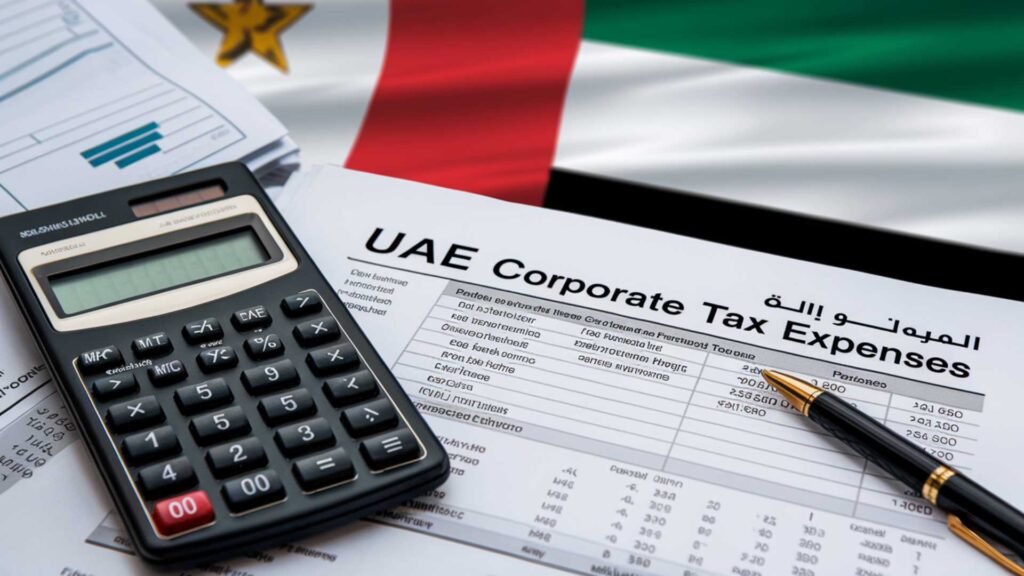Whether you’re an organization or financial expert, knowing the intricate details of corporate tax regulations can assist you in making informed choices and avoiding unnecessary penalties.
As 2025 approaches, remaining updated and proactive is key. Whether you’re a global business, a free zone entity, or a local company, the corporate tax structure in Abu Dhabi is here to influence the future of finance in one of the world’s fastest-growing economies.
This blog offers a step-by-step guide to determining corporate tax in Abu Dhabi, encompassing tax rates, exemptions, and compliance necessities.
Key Takeaways
- Corporate tax in Abu Dhabi is 0% for income up to AED 375,000 and 9% for income above this, with free zone companies enjoying 0% on qualifying income.
- Businesses must maintain accurate records, prepare financial statements, and file annual tax returns with the FTA.
- Exemptions apply to government bodies, nonprofits, and companies in natural resource extraction.
Overview of Corporate Tax in Abu Dhabi
In Abu Dhabi, corporations are subject to a direct tax on their net revenue or profit. While the Corporate Tax applies to companies, to make the nation more tax-friendly, Abu Dhabi has announced many reliefs, particularly for startups and new companies.
For licensed companies operating on Abu Dhabi mainland, the corporate tax system is as follows:
- A taxpayer is subject to a 0% tax rate on taxable earnings up to AED 375,000.
- Above AED 375,000, taxable income is subject to a 9% corporate tax.
However, companies that operate in free zones are subject to a different tax system:
- A 0% corporate taxation is applicable to the qualifying income for companies recognized as Qualifying Free Zone Persons (QFZP).
- 9% corporation tax is applied to non-qualifying income in the Free Zone, while there may be various exemptions or reliefs.
What are the advantages of registering for corporate tax in Abu Dhabi?
Businesses can profit from registering for corporate tax in Abu Dhabi in a number of ways, including:
- Compliance with Abu Dhabi taxation laws and regulations and avoidance of fines and penalties for non-compliance.
- Access to the EmaraTax portal, which enables companies to contact the FTA, request tax certificates, pay corporate tax obligations, file corporate tax returns, and apply for tax refunds
- Eligibility for tax agreements and tax reductions that Abu Dhabi has with other nations, which can lower the tax burden while improving the competitiveness of businesses
- Contribution to the economic growth and diversification of Abu Dhabi, as well as support for the government’s strategic goals and initiatives.
Who Needs to Pay Corporate Tax in Abu Dhabi?
The Corporate Tax is applicable to different organizations and people engaged in business operations.
Taxable person
Natural Persons
If a natural person’s annual revenue exceeds AED 1 million, they must register as a business entity operating under a commercial license. This includes: Sole Proprietors and Freelancers: Anyone doing business under their personal name has to register if they cross the revenue threshold.
These companies must register to receive any applicable relief, even if they are covered by the Small Business Relief provision (having less than AED 3 million in revenue).
Juridical Persons
Businesses and other legal entities that are incorporated in the United Arab Emirates or that are efficiently run and controlled there are subject to taxes.
Resident vs. Non-Resident Taxable Persons
Resident Taxable Persons
- Companies established in Abu Dhabi.
- Foreign companies whose effective management and control take place in Abu Dhabi.
Non-Resident Taxable Persons
- Foreign businesses operating through a Permanent Establishment (PE) in Abu Dhabi.
- Entities receiving income sourced from Abu Dhabi.
- Foreign entities earning income from immovable property located in Abu Dhabi
Who Is Not Subject to Abu Dhabi Corporate Taxation?
In order to promote social and economic advancement, some organizations are free from corporate tax, including:
- Government agencies and organizations under government control.
- Wholly owned subsidiaries carrying out specific activities.
- Businesses engaged in the extraction of natural resources (taxed at the Emirate level).
- FTA-approved nonprofit organizations.
- Investment funds that satisfy the relevant legal requirements.
Calculating Corporate Tax in Abu Dhabi

Here’s an organized approach to Abu Dhabi corporate tax calculation:
Step 1: Gather Financial Statements
Companies in Abu Dhabi need to make sure their financial statements have been prepared according to IFRS (International Financial Reporting Standards) or an equivalent standard. These statements include every revenue, operational expenses, and other economic activities during the fiscal year.
Step 2: Determine Taxable Income
The next step is to determine your taxable income. This is done by deducting any allowable company expenses, like operating expenses, wages, and depreciation, from your total revenue. Only your balance is considered taxable income.
Step 3 Calculate Corporate Tax
- Assess your net accounting profit according to your audited financial records.
- Apply any necessary modifications, such as exempt income and non-deductible expenses.
- Subtract the AED 375,000 small business threshold.
- Apply the 9% corporation tax rate to the remaining taxable earnings.
Step 4: Consider Special Cases for Free Zones
As long as they comply with the regulations, businesses operating in free zones can keep enjoying a 0% tax rate on revenue from eligible operations. However, corporation tax might be applied to that part of a free zone business’s income if it deals with mainland Abu Dhabi firms.
Businesses may consult the Federal Tax Authority’s (FTA) official recommendations for further information.
Step 5: Filing and Compliance
Corporate tax returns have to be filed annually. Companies are required to register with the Federal Tax Authority (FTA) for corporate tax. Maintain accurate accounting records and adhere to audit specifications.
Corporate Tax Compliance and Reporting Obligations in Abu Dhabi
Companies must adhere to a number of tax compliance and reporting requirements, such as:
1. Keeping accurate financial records
Companies must keep accurate financial records, including accounting books, invoices, receipts, etc.
2. Annual financial statement preparation
Businesses must create annual financial statements that adhere to applicable accounting standards or the International Financial Reporting Standards (IFRS).
3. Filing annual returns
Companies must submit annual returns to the tax authorities.
4. Renewing licenses
Licenses must be regularly renewed by businesses with the necessary authorities.
5. Meeting regulatory requirements
Companies must meet additional regulatory requirements, like acquiring the relevant licenses and permissions.
Businesses operating in Abu Dhabi should be aware of their different tax responsibilities and adhere to all relevant laws and rules. There could be fines and other consequences if you fail to do so.
Frequently Asked Questions
Is business tax-free in Abu Dhabi?
Historically, Abu Dhabi was recognized for its tax-free business environment. However, with the implementation of corporation tax for the fiscal year beginning on or after June 1, 2023, enterprises must pay taxes on their profits. Nonetheless, personal and certain other revenues are tax-free.
How Much is the Corporate Tax on Salaries in Abu Dhabi?
Wages and salaries are not subject to taxation in the United Arab Emirates; however, corporate taxes on business earnings are. The status of the business determines the rates and thresholds.
Is Corporate Tax Applicable to Free Zone Companies in Abu Dhabi?
According to the Ministry of Finance, qualifying enterprises in Abu Dhabi’s 30+ free zones that export costly goods to neighbouring states would now pay 0% tax. In a nutshell, free zone companies in Abu Dhabi must only pay corporate tax after they start producing qualified income.
Final thoughts
The corporate tax contributes to Abu Dhabi’s economic stability by assisting public services and infrastructure, hence promoting a balanced economy. Adhering to tax laws helps businesses improve their brand, preserve solid regulatory connections, and support their long-term success.
Businesses in Abu Dhabi can calculate their corporate tax by following the methods outlined above. Since the tax landscape is continuously changing, it is critical to examine your strategy on a regular basis and seek guidance from Abu Dhabi tax specialists. By being proactive and keeping yourself updated, your company can navigate the challenges of Abu Dhabi corporate taxes.


